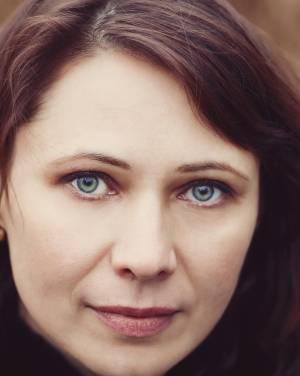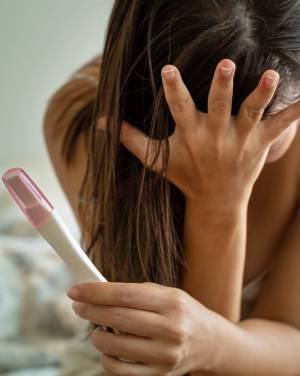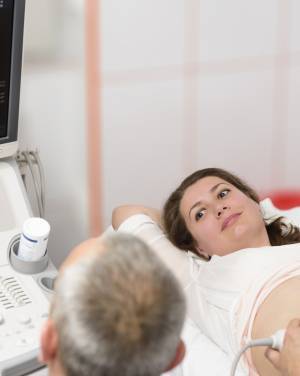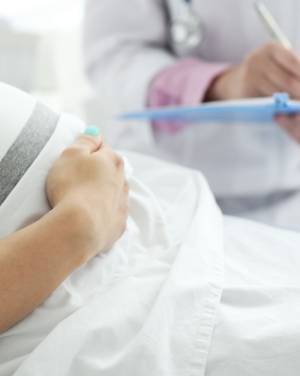Until What Age Can You Get Pregnant?
-
It is possible to become pregnant during perimenopause.
-
The transition to infertility takes place in several phases, which occur at different points in time for each woman.
-
Many women who experience menopausal symptoms at 40 can still conceive naturally for an extended period of time.
This article addresses the phases of menopause and age limits to becoming pregnant.
-
What Is Menopause?
Until What Age Can You Get Pregnant?
How Do I Know When I Have Reached Infertility?
Signs & Symptoms of Menopause
Am I Pregnant, or Are These Merely Symptoms of Menopause?
Can Menopause Falsify My Pregnancy Test?
(Unintended) Menopause Pregnancy — Experience Reports
(Suspecting) Menopause Pregnancy and Many Questions...?
You may like:
- 🤰Am I pregnant? Take the Online Pregnancy Test!
Do you have any questions or concerns? Write your message directly here ⬇️
What Is Menopause?
Menopause (climacteric) is a phase of hormonal change that initiates the conclusion of reproductive years. It varies from woman to woman, and its onset is not accurately predictable.
It is hard to predict the onset of a young woman’s fertile years. The exact beginning of a woman’s childbearing age can vary greatly. This is also the case with its cessation. Even though we assume that most women can conceive during a time span of about 35 years, there’s no set number of reproductive years. The end of a woman’s fertile period is difficult to pinpoint.
Until What Age Can You Get Pregnant?
Menopause can last up to ten years and is comprised of three phases:
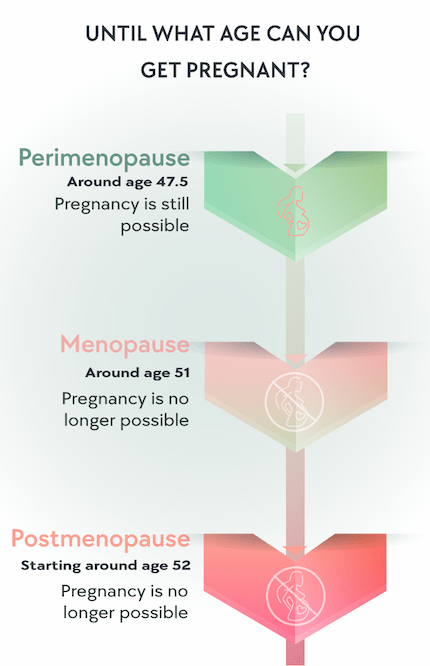

1) Perimenopause
Perimenopause is the interval just before menstrual periods stop permanently.
It begins at an average age of 47.5 years.
Some women do not notice any symptoms, while others temporarily miss their periods or experience a shortened menstrual cycle. During this hormonal change, it is possible for menstrual cycles not to include ovulation.
→ Pregnancy is still possible during this phase.
2) Menopause
This term refers to the period of time starting with the last menstrual bleeding, followed by at least 12 consecutive months without a menstrual period. This point in time can only be correctly determined retrospectively. In this respect, menstruation takes its leave just as quietly as it once began many years before.
The average age for menopause is 51.5 years. (International Menopause Society)
→ During this phase, pregnancy is no longer possible.
3) Postmenopause
These are the years following menopause. From then on, a woman can't have her period naturally or conceive a child.
This phase begins at around 52 years of age.
However, there are always exceptions!
These numbers are all averages. No two women are alike; each woman experiences menopause uniquely and distinctly. In rare cases, a woman's ovaries can be prematurely depleted at around age 40, so ovulation can no longer occur. This is called premature ovarian failure, or early menopause.
How Can I Tell When My Childbearing Age Is Over? — Fertility Status Check
Remote assessments concerning the human body, including menopause, are never entirely reliable. Nevertheless, here is a rule of thumb for drawing conclusions about your current fertility:
Menopause is an excellent occasion to seek medical advice, as this is a period when your body undergoes drastic changes. Your physician can provide a professional assessment of whether pregnancy is still possible.
Your doctor will likely analyze your hormonal satiation via your saliva, urine, or blood. These hormone tests check your levels of estrogen and FSH (follicle-stimulating hormone). Unfortunately, hormone levels fluctuate heavily during this season in life. It is simply a time of change. Therefore, the test is performed repeatedly over an extended period of time.
ℹ️ The AMH blood test can provide a more precise indication of whether you are still in your reproductive years or menopause has already begun. The anti-Mullerian hormone (AMH) is produced within your follicles and is responsible for the maturation of your egg cells. The lower your levels of AMH, the less likely you are to ovulate, thereby decreasing the chance of conception. A reduction in AMH levels means reduced fertility. If the amount of AMH in your blood is below 1,6 nanograms per milliliter (ng/mL), you are no longer fertile.
Talk to your doctor to determine whether this test is right for you.
Signs & Symptoms of Menopause
Many women notice preliminary indications of menopausal onset in their early forties. However, the presence and extent of menopausal symptoms varies from woman to woman.
Symptoms include:
💪 Physical:
- Irregular menstrual cycles (e.g., unusually longer/shorter cycles)
- Hot flashes
- Breast tenderness
- Drier skin and an increase in wrinkles
- Vaginal dryness
- Fatigue
- Water retention
If you are closely in tune with your body, you will also notice:
- Earlier rise in temperature (likely due to early ovulation)
- Shorter temperature highs
- Altered (worsened) cervical mucus quality
🙃 Emotional:
- Increased and unusual irritability
- Decreased libido
- Insomnia
Am I Pregnant or Menopausal?
After a missed period, many women over 40 wonder whether they are pregnant or whether this is the onset of menopause. Other symptoms add to the confusion since pregnancy and menopause are both marked by hormonal changes. Therefore, a woman’s body may have a similar response to either.
- 📖 The article Signs of Pregnancy lays it out for you, including a self-evaluation.
- 🤰🏻 You can also take our Online Pregnancy Test.
- Gain clarity by taking a home pregnancy test, available at your local pharmacy.
Can Menopause Falsify My Pregnancy Test Result?
It can be disorienting to read in the instructions that the test result can be falsified by menopause.
Especially when the urine-based test is positive, you would naturally ask yourself, "Is this a false positive, or am I really pregnant?"
🤔 If this is your situation, it is understandable that you would desire clarity.
False positives are very rare. The result is sometimes falsified when tests react not only to the pregnancy hormone HCG, but also to LH (luteinizing hormone). This hormone can be elevated during the hormonal changes of menopause.
What to do: Purchase a second pregnancy test from a different manufacturer. It is usually the cheaper tests that are too sensitive to the presence of LH. Getting a more accurate result may be worth the higher investment. If this test is also positive, you are most likely pregnant.
Of course, you can also speak to your gynecologist.
(Unintended) Menopause Pregnancy — Experience Reports
A woman's fertility considerably decreases by her early 40s. That does not mean she can't become pregnant after 40, but the likelihood of conception in any given cycle drops to 5%.
Maybe you are wondering what women who became pregnant during menopause experienced...
Unplanned Pregnancy During Menopause
Many women who unintentionally become pregnant during menopause are riddled with concerns, “Am I not too old for a baby? Do I still have enough energy to be a mother (again)? Is my child's development normal?”
At the same time, an unexpected pregnancy during menopause can also be the last chance of becoming a mother — and a chance to enjoy motherhood from a much more mature perspective, leaning on many years of experience...
- 📗 Read more: Over 40 — Too Old for a Baby?
- 💪 Wondering whether you have what it takes? Take the Strengths Finder Test!
Planned Menopause Baby
Although chances of conceiving are significantly reduced during these years, some mothers successfully become pregnant at an advanced age. In this career-oriented age, when women increasingly pursue professional goals, the median age for new moms is pushed further back.
Many women find that leaning on their life experience, they have become more laid-back. They look forward to this new role and responsibility.
Unfortunately, this joy can be dampened by an accompanying concern about fetal development.
Could My Baby Have Birth Defects?
Some risks are increased with higher maternal age — miscarriages are more common, as are fetal defects. Finding ways to conquer this fear will look different for each woman.
Almost 80 percent of all pregnancies occurring after a woman’s mid-40s end in miscarriage. However, most miscarriages go unnoticed, as the majority occur within the first four weeks of pregnancy.
Today’s medical advancements and higher living standards allow for healthy pregnancies and births, at an advanced age. Even here, birth defects are still the exception.
Some mothers have given birth to a healthy baby at age 53.
 489618412 | Ground Picture | shutterstock.com
489618412 | Ground Picture | shutterstock.com
The vast majority of babies are born healthy.
Sometimes the term "high-risk pregnancy" can be confusing. Any pregnancy above the maternal age of 35 is termed “high-risk." According to statistics, some risks already increase, even before menopause has commenced.
This means that any pregnancy over 35 is monitored more closely. This translates into more frequent check-ups to ensure mother and baby receive the necessary care.
(Suspecting) Menopause Pregnancy — A Lot to Consider…
Perhaps you are reading this because you are wondering whether you could be pregnant, causing you great concern or joyful anticipation.
At first glance, early pregnancy symptoms are not easily distinguishable from possible menopausal markers or indicators of PMS.
Or has your pregnancy been confirmed, and now you feel unsure about what to do? Were you done with having more children, or had you already made other plans?
You are not alone! Will you allow us to walk alongside you as you process your thoughts and concerns? Our resources provide you with a judgment-free environment allowing you to find the path that is right for you:
- ⛑ Where do I go from here? — Quick Answers Quiz
- ⚖️ Are you wondering whether to have an abortion? Take the Abortion Test

